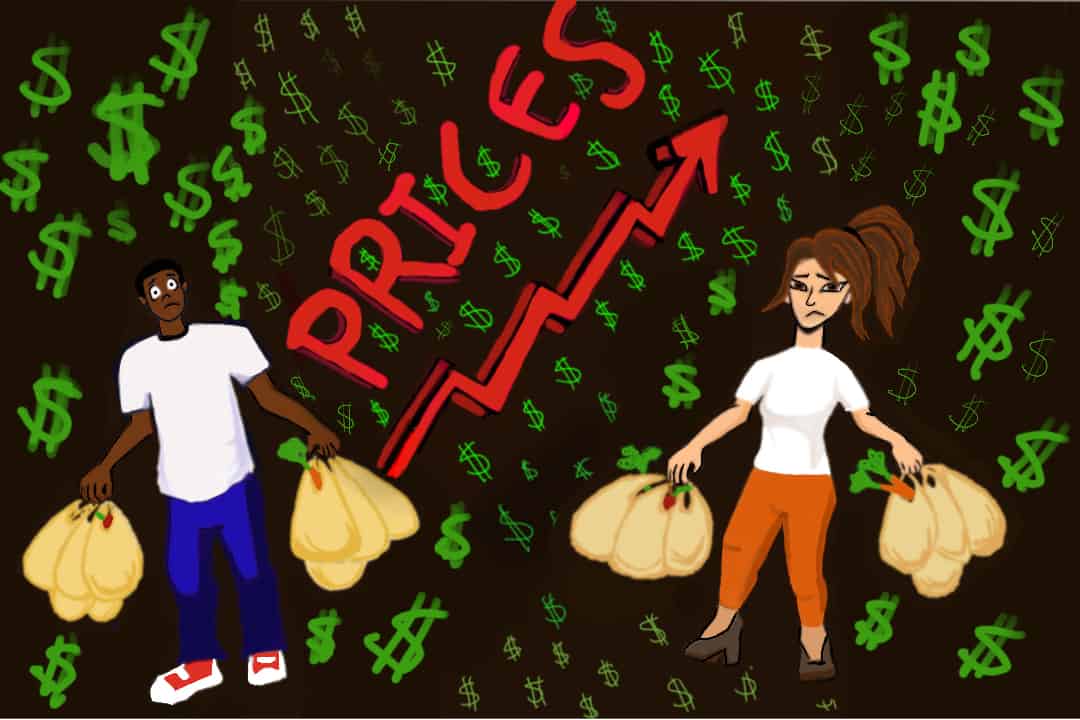No, it’s not just you: things are getting more expensive. The average price of goods in Canada rose seven per cent between August 2021 and 2022. Over the last 12 months, grocery prices have increased by 10.5 per cent, the highest rate in 40 years.
“A few months ago, I was buying some apples, and I think it came up to $2 per apple, which really shocked me,” recounts Rachel Lin, a third-year Rotman Commerce student, in an interview with The Varsity. Jakob Kramer, a third-year philosophy specialist, said, “I bought two days worth of dinner — so two meals’ worth of food — and it was $60.”
This overall rise in prices is called inflation. Slow and steady inflation is generally a good thing, even if costs are higher for consumers; it indicates that people are buying things, therefore businesses can make a profit and people can find jobs. Earlier in the pandemic, people had feared that no one would be spending any money in the wake of lockdowns, causing prices to deflate, leaving people unemployed. Two years into the pandemic, we are seeing the opposite trend.
The culprits behind inflation
A fun cocktail of current events is jacking up the prices of Canadian goods. A ban on Russian crude oil, a shortage of Ukrainian cooking oil and wheat, and droughts in Canada’s farming regions are making food items more scarce. Meanwhile, everyone is itching to go out after 24 months of being forced to stay indoors. Essentially, people are consuming faster than suppliers can provide.
The Progressive Conservative (PC) party of Canada, meanwhile, has coined the rise in prices “Justinflation,” placing the blame on Justin Trudeau government’s spending. At the beginning of the pandemic, the Bank of Canada had provided people with a considerable monetary boost by lowering interest rates and purchasing assets to help relieve the economic downturn that the lockdown had caused. However, increased government spending can disrupt the delicate balance between demand and supply, and thus drive up prices.
Another viable culprit is private corporations. Loblaws, the largest grocery store chain in Canada, has grown its profits by over 40 per cent in the last year, and commentators are accusing the company of hiking its prices excessively. These commentators argue in a Toronto Star report that if price increases were proportional to rising inventory costs then profit margins should remain the same. Grocery giants Empire and Metro have also seen boosted profits in the last few months.
The consequences of inflation
Avoiding more expensive grocery items isn’t possible when essential items are all rising in price at the same time, said Charmaine Handojo in an interview with The Varsity. “There’s only so much you can cut.’ Handojo is a third-year student double majoring in ethics, society, and law; and bioethics.
According to Kramer, an alternative option is consuming less to keep costs down. Kramer resorted to unhealthy habits in an attempt to cut his costs. “I eat less food… I almost passed out last week, ” he said.
Handojo shared her view on the pros and cons of inflation: “It’s not a good thing or a bad thing, but when the prices go up and wages don’t, I think that is bad.” Indeed, average wages in Canada are lagging behind as the price of essential goods increases. This means that students have less money to spend on non-essentials. Kramer said, “I’ve also had to turn down just about every social invite, because I can’t afford to go to restaurants.”
Working students must also put in more hours in order to cover their expenses. Samuel Dumas, a third-year mathematics major, works around 20 hours a week: “I can definitely look at points towards the middle of the semester when I feel so wiped. I barely sleep.”
For some economists, the hope is that increased prices will slow down consumer spending, helping to curb the price spike and making goods affordable again. Others are skeptical of such a mindset. Kramer describes it as “[letting] 10 per cent of people starve, and then [figuring] out how much food everyone [else] needs.”
What’s the solution?
In response to rising prices, the minimum wage in Ontario is increasing from $15.00 to $15.50 on October 1. It has increased over the last 12 months by about eight per cent, as last October, it was set to $14.35. At the same time, the Ford government is currently defending provincial legislation that caps wage increases at one per cent a year for public sector workers such as nurses and teachers.
Another possible response to inflation is to regulate the cost of essential goods like groceries so that people’s access to them is not dependent on private corporate decisions. Kramer urged his view that “there are systems in which you can organize an economy and create goods that don’t put the suffering and the loss of individual humans on the line.”
Inflation also increases house prices. “I hope the problem isn’t so severe, that by the time I come to the stage in my life where I hope to be a homeowner and have to put down a mortgage, that the interest [rates] are so screwed up that it is unfeasible,” Dumas reflected.


